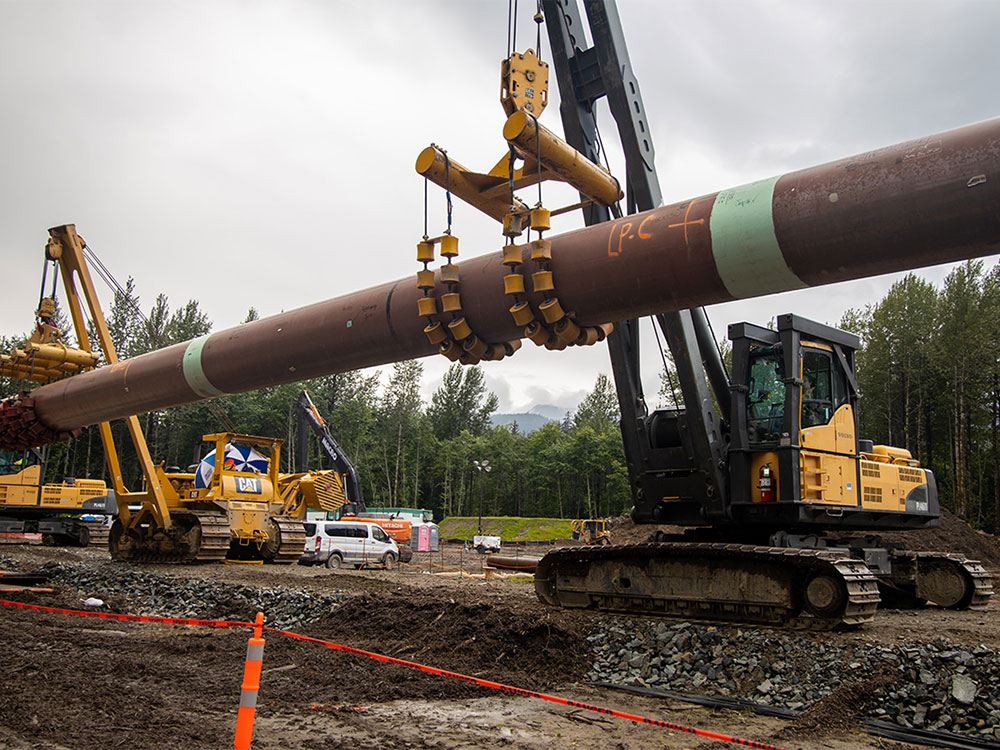Four First Nations partnerships that worked on the Coastal GasLink pipeline are now suing the company and a former prime contractor for $10 million, alleging they haven’t been paid for all their work.
Three northern First Nations are involved in the four companies that filed claims against Coastal GasLink and Pacific Atlantic Pipeline Construction Ltd., a prime contractor on the project until earlier this year. All four civil claims were filed in the B.C. Supreme Court within weeks of each other in June and July.
In the claims, Kyah Resources Inc., Frost Natanlii LP, NWF Resources Ltd. and Kyah Summit Camp Services say they have completed the work but have not been fully paid. The first three companies provided pipeline route clearing services and the fourth provides worker accommodation.
PAPC is the Canadian subsidiary of Bonatti Group, an Italian company.
It was responsible for construction along more than one-third of the pipeline route.
Through its lawyer, PAPC declined to comment on the claims, noting the cases are currently before the court. It did not respond to questions about its removal from the Coastal GasLink project earlier this year.
TC Energy, the Calgary-based parent company of Coastal GasLink, confirmed in an email to The Tyee that it terminated PAPC’s contract “due to numerous ongoing problems, including the non-payment of subcontractors.”
It expressed concern over its former prime contractor’s failure to pay the companies.
“We are aware that PAPC has failed to pay some of its subcontractors in full. We truly value the reciprocal business relationships that we have with Indigenous and local businesses across the project route,” a spokesperson said in a statement.
Coastal GasLink is responding to “several” lien claims based on the alleged unpaid bills and will comply with its obligations under the B.C. Builders Lien Act, the spokesperson said. Under the act, contractors and suppliers can hold owners of a construction project accountable for outstanding debts by filing a claim on the assets.
TC Energy’s spokesperson acknowledged the potential harm to First Nations communities.
“We are equally concerned that the failure of PAPC to pay its subcontractors in full will have an impact on the communities which benefit from their partnerships with the project,” the company said. “We are taking appropriate steps through the legal process in order to resolve all lien claims and have urged PAPC to expedite a resolution and pay amounts owing.”
The company is limited on what it can say as the claims go through the legal process, the spokesperson added.
The 670-kilometre gas pipeline, which is under construction between northeast B.C. and LNG Canada in Kitimat, has faced fierce opposition from Wet’suwet’en Nation hereditary leaders and their supporters. Efforts to block pipeline construction through the nation’s traditional territory have led to several high-profile police actions and dozens of arrests in recent years.
Coastal GasLink has blamed the protests and COVID-19 pandemic for putting the pipeline behind schedule and significantly over budget.
The Tyee reached out to First Nations affected by the lawsuits but did not get a response by deadline. The companies and their lawyers also did not respond to requests for comment.
Neither PAPC nor Coastal GasLink have filed a statement of defence in response to three of the four lawsuits.
In a response by PAPC to a joint claim filed by Frost Natanlii LP and Frost Natanlii Developments, a collaboration between Prince George-based Frost Group partnerships and Natanlii Development Corp., the global pipeline company denied responsibility for $2.3 million in unpaid invoices.
“If there is any amount presently due and owing from PAPC to either of the Plaintiffs, which is not admitted but denied, neither of the Plaintiffs is entitled to payment of the amount claimed,” the response reads.
Natanlii Development Corp. is the economic development arm of the Skin Tyee First Nation, a small Wet’suwet’en community of about 200 people located 250 kilometres west of Prince George.
Frost Group is also involved in another legal action against PAPC and Coastal GasLink. NWF Resources Ltd. is a partnership between the Prince George forestry company and Nadleh Whut’en First Nation, a Dakelh community of about 500 people near Fraser Lake, 150 kilometres west of Prince George. The partnership says it is owed more than $600,000, according to court documents.
The largest amounts alleged to be outstanding were to two companies associated with the Witset First Nation, a Wet’suwet’en community with about 1,800 members located 400 kilometres west of Prince George.
Kyah Resources Inc. says it is owed more than $3.7 million for unpaid work from PAPC. The company is headquartered in Kamloops but is majority owned by Witset First Nation, according to its website, and entirely Wet’suwet’en-owned.
The fourth company seeking payment, saying it is owed $3.6 million from PAPC, is Kyah Summit Camp Services, a collaboration between Witset First Nation and Summit Camps, a company providing work camp services from Smithers.
PAPC, whose parent company is Italy’s Parma-based oil and gas giant Bonatti Group, is incorporated in Alberta and also uses a Vancouver address. The company does not have its own website, instead using a site dedicated to Bonatti Group’s international work. The site shows no current projects in Canada.
In 2016, the Guardian reported on a study by Bankwatch Network. The Guardian report said that Bonatti Group was among several firms with “links to cartels, corruption and the mafia” that had been hired to build a gas pipeline between Europe and Azerbaijan, according to the watchdog group. Bankwatch is a Prague-based non-profit funded by philanthropists, environmental organizations and European Union government agencies that monitors financial agencies “to expose their influence and provide a counterbalance to their unchecked power.”
According to the report, in 2010 one of Bonatti’s subcontractors in Italy was issued an “interdittiva antimafia” — or a ban on public contracts — by the Italian police for its connections to the mafia. Then, in 2015, CEOs of two other companies subcontracted by Bonatti were jailed of “extortion and their association with mafia clans,” the report added.
The Guardian noted the companies were subcontractors of Bonatti Group and not the company itself. It also reported Bonatti’s response that the allegations were “groundless.”
Bonatti’s code of ethics says it “rejects” any form of criminal organization, particularly mafia associations.
In 2020, a Kazakhstan-based development council advocating on behalf of oil and gas companies also noted Bonatti had been sued for unpaid bills.
Coastal GasLink’s decision to hire Bonatti’s PAPC as a prime contractor dates back to June 2018, when it announced that it had conditionally awarded $2.8 billion in contracts to four companies.
PAPC was initially given responsibility for sections 6 and 7 of the pipeline route.
“In selecting our prime contractors, we sought out highly qualified companies that met our core principles for safety, environmental stewardship and stakeholder engagement,” Coastal GasLink said in introducing PAPC in December 2019.
At the time, Doug Lougheed, who was PAPC’s Calgary-based principal consultant of regulatory and compliance management until last year, emphasized the company’s focus on hiring local contractors.
“It’s very important to us that we maximize the participation of First Nation and local communities in the project,” he said. “It will bring tremendous benefits to local communities and suppliers throughout British Columbia who will support the project infrastructure.”
A year later, PAPC was also awarded the contract for Section 5, replacing Macro Spiecapag Joint Venture, and giving it oversight of roughly 250 kilometres of the 670-kilometre pipeline route.
What followed has been a musical chairs of prime contractor replacements in the western portion of the pipeline route.
The next change came in May 2021 when Coastal GasLink announced that Ledcor-Haisla LP would replace MSJV in a portion of Section 8, the route’s most technical section, to allow MSJV “to focus on the east portion.”
Then, earlier this year, Coastal GasLink began replacing PAPC in its three pipeline sections.
In March, it announced that a collaboration between Macro Pipelines and business partners Nadleh Whut'en First Nation and Frost Group would replace PAPC in Section 5.
The following month, it announced that PAPC had been replaced in Section 7 by O.J. Pipelines, which had partnered with Skin Tyee First Nation, Wet’suwet’en First Nation and Witset First Nation.
Then, last month, the company announced that it had replaced PAPC with Michels Canada in Section 6, a replacement that took effect earlier this year.
In its email to The Tyee, Coastal GasLink emphasized the project’s scope and complexity, calling it “one of the largest and most complex projects in Canadian history.”
It addressed The Tyee’s questions around quality assurance by saying it remains focused on delivering the project “safely, efficiently and to the required standard” and that inspections take place “every step of the way” to ensure quality during the construction phase.
The project’s cost estimates have ballooned significantly, with the company announcing this summer that costs would increase from an initially estimated $6.6 billion to $11.4 billion. It has been cited more than 50 times for environmental violations.
The company has repeatedly pointed to impact benefit agreements signed with First Nations along the pipeline route, including five Wet’suwet’en bands, as evidence of support for the project. ![]()
Read more: Indigenous, Energy

















Tyee Commenting Guidelines
Comments that violate guidelines risk being deleted, and violations may result in a temporary or permanent user ban. Maintain the spirit of good conversation to stay in the discussion.
*Please note The Tyee is not a forum for spreading misinformation about COVID-19, denying its existence or minimizing its risk to public health.
Do:
Do not: